The 5 Most Influential Spanish Female Rappers in the Current Music Scene
Rap is a music genre that has rapidly expanded in recent years worldwide, and Spain is no exception. Currently, there are numerous Spanish female rappers who are leading the music scene with their skills, charisma, and lyrics filled with social criticism and feminism. In this article, we present to you the 5 most influential Spanish female rappers in the current music scene. Discover their music, career, and the impact they are making in the music industry and society at large. From the most combative rap to the most melodic, these rappers are proving that the genre has no gender and that their voices deserve to be heard. Want to get to know them? Let’s get started!
The Female Rap Scene in Spain: Evolution and Perspectives
The female rap scene in Spain has evolved considerably in recent years, going from being a rarity to becoming an integral part of the genre. The presence of female rappers in the music industry has grown in both quantity and quality, and their music has become a powerful tool to express their struggles and demands.
In the early days of rap in Spain, there were very few women involved in this genre, but in recent years, the situation has changed significantly. Artists such as Mala Rodríguez, La Zowi, Bad Gyal, La Mala, Nathy Peluso, and Anier have gained great influence within the music scene, becoming some of the country’s top female rappers.
These female rappers have used their music as a way to express their struggles and demands, addressing topics such as gender equality, the fight against racism, discrimination, and oppression. In doing so, they have managed to connect with an increasingly wider audience and have contributed to the dissemination of rap and its message.
As for perspectives, it is expected that female rap will continue to gain ground in Spain. As more women join the scene, the diversity within the genre expands and enriches. Furthermore, it is expected that the music of Spanish female rappers will continue to influence popular culture, and spaces will continue to open up for their messages and struggles to be heard.
Mala Rodríguez: The Pioneer of Female Rap in Spain
Mala Rodríguez is one of the most important figures in the history of rap in Spain, and her influence on the music scene has been fundamental. She is also known as “La Mala,” a name that has accompanied her since her early days in music when she was a teenager starting to write and rap in Seville.
Since then, Mala Rodríguez has been considered one of the first female rappers in Spain, paving the way for other artists who have come after her. In her songs, she has addressed topics such as inequality, discrimination, gender violence, and the fight against racism, among others.
Her first album, “Lujo Ibérico,” released in 2000, was a great success, and since then, her career has been on the rise. She has collaborated with other artists such as Calle 13, Romeo Santos, Tego Calderón, and Juan Magán, and has released several albums and singles that have had a significant impact on the music scene, establishing her as the most iconic female solo rapper.
Mala Rodríguez has also received several accolades for her work in music, including multiple awards at the Premios de la Música, Premios MTV, and Premios Grammy Latinos. Her influence in popular culture extends beyond music, having appeared in TV series and films, as well as in advertising campaigns and fashion.
The Origins of Mala Rodríguez: The Influence of American Rap on Her Music
From a young age, Mala Rodríguez was drawn to hip-hop culture, particularly American rap, which she started listening to in her adolescence. This musical genre inspired and motivated her to write her own lyrics, reflecting her reality as a young Sevillian woman of Gypsy origin.
It was in the 1990s when Mala Rodríguez began to make a name for herself in the music world, thanks to her early appearances on local radio and television programs. At that time, she was part of a generation of young artists who were attracted to rap and hip-hop, seeking a place in Spanish music.
American rap was a significant influence on Mala Rodríguez’s music and her style of writing and singing. Her lyrics reflect the social and political reality of Spain, and the lives of Gypsy women in particular, and her rap style is inspired by the aggressive and direct approach of East Coast rap in the United States.
Mala Rodríguez has been influenced by some of the great names in American rap, such as Wu-Tang Clan, Public Enemy, and Nas, but she has also incorporated elements from other musical genres such as flamenco, reggae, and rock, creating a unique and authentic style.
Mala Rodríguez’s Career: Her Greatest Hits and Achievements in the Music Industry
One of Mala Rodríguez’s biggest successes was her debut album, “Lujo Ibérico,” released in 2000. This work was a resounding success and became one of the most important hip-hop albums in the Spanish scene. With this album, Mala Rodríguez captured the attention of the public and the music industry, establishing herself as one of the prominent figures in Spanish rap.
From there, Mala Rodríguez’s career has continued to grow and expand. Her second album, “Alevosía” (2003), was another major success and solidified her position as one of the most significant artists in Spanish music. With this album, Mala Rodríguez won her first Premio de la Música (Music Award) in the Best Hip-Hop Artist category.
In the following years, Mala Rodríguez continued to achieve success and gain recognition. In 2007, she released “Malamarismo,” her third album, which received very positive reviews and established her as one of the most innovative and versatile artists in Spanish rap music. With this album, Mala Rodríguez won the Premio de la Música for Best Hip-Hop Album.
In the subsequent years, Mala Rodríguez has continued to experiment with different genres and styles and has collaborated with some of the most important artists in Spanish and international music. She has won several awards and recognitions, including the National Award for Current Music in 2019.
Mala Rodríguez’s Legacy: How She has Influenced Spanish Female Rap and Popular Culture in General
Mala Rodríguez has been one of the main influences for the female rappers who have emerged in Spain in recent decades. Her style, message, and attitude have inspired many young artists who have followed in her footsteps, creating a strong community and an important artistic movement. Furthermore, her impact on Spanish female rap has been such that the music industry has started to pay attention to female artists and create more spaces for them.
However, her influence extends beyond the realm of female rap. Her legacy has transcended the genre and reached other areas of popular culture. Her attitude, discourse, and style have influenced fashion, television, cinema, and other realms of popular culture. Her image has been referenced in TV series and movies, and her music has been used in advertising campaigns and television programs.
Mala Rodríguez’s legacy is a testament to the impact that artists can have on culture and society. Her ability to narrate personal and social stories in a raw and direct manner has created a deep connection with her audience, allowing many young people to identify with her lyrics. Her legacy has inspired a new generation of artists who continue to carry the message of struggle and empowerment that she has represented throughout her career.
La Furia: The Collective Fighting for Equality and Women’s Rights
La Furia is a feminist rap collective originating from Spain that has captured the attention of a wide audience in recent years. Through their music, La Furia has made a strong commitment to gender equality and women’s rights.
This collective, composed of three women, has established a strong presence in Spanish rap thanks to their provocative lyrics and unique style. Their music focuses on topics such as sexual harassment, gender-based violence, and patriarchal oppression, allowing them to deeply connect with their audience and become role models for many women and young people.
In addition to their musical work, La Furia has been active in the fight for gender equality and women’s rights. They have been one of the driving forces behind movements like #YoSíTeCreo, which supports victims of sexual violence, and have actively participated in demonstrations and campaigns advocating for women’s rights.
The Emergence of La Furia: How a Group of Women Came Together to Make Rap and Fight Patriarchal Oppression
The emergence of La Furia, a feminist rap collective originating from Spain, began with a group of women who wanted to come together to make music and fight against patriarchal oppression. In the early 2010s, the three members of the group, Paula, Blanca, and Aiala, met in a creative writing workshop and quickly discovered their shared passion for music and the fight for gender equality.
Inspired by artists like Mala Rodríguez, who had paved the way for female rap in Spain, they decided they wanted to use their music to fight for women’s rights. They started writing songs that addressed topics such as gender-based violence, sexual harassment, and patriarchal oppression, and performed in small venues in Madrid and other Spanish cities.
Quickly, La Furia began to gain followers thanks to their unique and provocative style, as well as their clear and direct message. The three members of the group stand out for their powerful lyrics, which showcase the strength and resilience of women against oppression and sexism.
In a short amount of time, La Furia became a powerful force in Spanish rap and the feminist movement. They have participated in demonstrations and protests, and have been involved in movements like #YoSíTeCreo, which supports victims of sexual violence. Additionally, they have collaborated with other feminist artists and have tirelessly worked to spread their message.
La música de La Furia: Style and Recurring Themes in Their Songs
The lyrics of La Furia are direct and powerful, addressing the everyday experiences of women and the resilience and strength needed to confront oppression. The group has successfully merged music with activism, and their songs serve as a call to action for all women seeking change.
One of La Furia’s most emblematic songs is “Las penas son de nosotros” (“The Sorrows Are Ours”), which addresses sexual harassment and gender-based violence. The lyrics depict the reality faced by many women in their daily lives and have become an anthem for those fighting against macho violence.
Another well-known song by La Furia is “Dame veneno” (“Give Me Poison”), which speaks about women’s empowerment. The lyrics serve as a call to action for women to raise their voices and fight for their rights.
La Furia and Feminism: How the Group has Contributed to Spreading the Feminist Message in Society and the Music Scene
Since their inception, La Furia has fought for gender equality and women’s rights, using their music as a tool for social awareness. Their lyrics denounce patriarchal oppression and serve as a call to action for women striving for a fairer and more equal world.
The group has utilized their platform to raise awareness about pressing issues for women today, including gender-based violence, sexual harassment, and discrimination. They have participated in numerous demonstrations and events to promote the feminist message and have become role models for many young women seeking a voice in the fight for equality.
In the music scene, La Furia has become a reference point for other artists seeking to merge music with feminist activism. They have collaborated with other groups and artists who share their message and have achieved significant influence in the alternative music scene.
The Latin Roots in Spanish Rap: Nathy Peluso’s Style
Nathy Peluso is an Argentine artist who has had a significant influence on the rap and urban music scene in Spain. One defining characteristic of her musical style is the fusion of Latin roots with rap and other urban genres.
The Latin roots in Nathy Peluso’s music can be found in various elements of her versatile style, such as the use of rhythms and melodies from Latin music genres like salsa, tango, and bolero, combined with rap music to create a unique and fresh style. Additionally, the artist frequently incorporates Spanish and Italian into her songs, reflecting her own cultural roots.
Another standout aspect in Nathy Peluso’s music is the references to Latin popular culture, which are evident in her lyrics and visual style. The artist has mentioned in various interviews that her biggest influences are Latin artists such as Celia Cruz, Selena, and Julio Iglesias.
The fusion of Latin elements with rap and other urban genres that Nathy Peluso incorporates in her music has been a significant contribution to the development of Spanish rap and has created a unique set of styles that is unparalleled in the current music scene.
Furthermore, her style and music have been an inspiration for other artists and musicians seeking to incorporate Latin elements into their own creations. In summary, Nathy Peluso has demonstrated that Latin roots and rap can merge to create an innovative and exciting musical style that has had a profound influence on urban music in Spain and beyond.
The Life and Career of Nathy Peluso: Her Origins, Influences, and Major Successes in Music
In 2016, Nathy Peluso moved to Spain, where she began to make her music known. In 2017, she released her first single, “Corashe,” which quickly became a hit on digital platforms. In that same year, she published her first album, “Esmeralda,” which blends rap, salsa, jazz, and other genres, and led her to embark on her first tour of Spain and other European countries.
In 2018, Nathy Peluso released “La Sandunguera,” a song that pays homage to the music of the 1950s and became one of her biggest hits. In the same year, the artist released her second album, “La Sandunguera,” which was also well-received by critics and the public.
In 2020, during the pandemic, Nathy Peluso released her third album, “Calambre,” which features a blend of musical genres such as hip hop, salsa, jazz, and funk. The album includes songs like “Buenos Aires,” “Sana Sana,” and “Natikillah,” among others, which have been highly popular and have helped solidify her position as one of the most influential artists in urban music.
Nathy Peluso’s music career is characterized by the fusion of Latin elements with rap and other urban genres, creating a unique and fresh style in the music scene. In addition to her music, Nathy Peluso has also stood out for her visual style and her commitment to social causes such as feminism and LGBTQ+ rights.
Nathy Peluso’s Style: How She Has Combined Rap with Other Genres such as Jazz, Soul, and Funk, and How She Has Developed Her Own Style
In her songs, one can appreciate the elements of rap in Nathy Peluso’s vocal technique, the use of rhymes, and the cadence in which she sings. However, unlike many rappers, Nathy Peluso also sings, utilizing her voice in a more melodic register in some parts of her songs.
In addition to her vocal technique, Nathy Peluso has also experimented with different instrumentations and arrangements, often incorporating brass sections to add a touch of jazz to her songs or incorporating samples of Latin music to infuse a Latin flavor into her tracks. This has allowed her to stand out in an industry where rap and hip-hop have traditionally been confined within certain boundaries.
Overall, Nathy Peluso’s style has been a significant contribution to the evolution of Spanish rap and has helped break musical and cultural barriers in the music scene, making her one of the most recognizable female voices.
Nathy Peluso and Her Relationship with Latin Culture: How She Has Integrated Latin Culture into Her Music and How She Has Influenced the Music Scene in Spain and Other Countries
Nathy Peluso, in addition to her ability to blend different musical genres, has also been recognized for her capacity to integrate Latin culture into her music. In her lyrics, she has included references to her Argentine heritage, such as tango and folklore, but she has also incorporated elements of other Latin genres such as salsa, merengue, and reggaeton.
The integration of Latin culture into her music has been a significant contribution to the music scene in Spain and other countries. Rap and hip-hop haven’t always been genres associated with Latin culture, but the inclusion of Latin elements in her music has helped open new doors for urban music as a whole.
Nathy Peluso has been recognized both in Spain and Latin America for her unique style and her ability to blend genres and cultures. Her music has been embraced by a diverse audience, including those who traditionally haven’t been followers of rap or hip-hop.
In addition to her impact on the music scene, Nathy Peluso has also been an advocate for Latin culture and has spoken about the importance of representation and inclusion in music and culture at large. Her work has served as an example for other artists seeking to integrate their culture and heritage into their music, and she has helped spread Latin culture in the international music scene.
FREQUENTLY ASKED QUESTIONS:
Who are the 5 most influential Spanish female rappers in the current music scene?
The 5 most influential Spanish female rappers in the current music scene are: Mala Rodríguez, Ptazeta, Sara Socas, Nathy Peluso, and Anier.
Why are these rappers considered influential in the music scene?
These rappers are considered influential due to their significant impact on music and popular culture in Spain, whether it’s their innovative musical style, their presence on social media, or their ability to challenge social and gender norms.
What are some of the notable successes of these rappers?
Some of the notable successes of these rappers include Mala Rodríguez’s “Alevosía,” La Zowi’s “Money Hoe,” and Nathy Peluso’s “Natikillah.”
What messages do these rappers usually convey in their songs?
These rappers typically convey messages that challenge social and gender norms, as well as advocate for individual freedom and personal expression. They often address topics such as sexuality, empowerment, and social criticism.
How have these rappers influenced Spanish popular culture?
These rappers have influenced Spanish popular culture in various ways, such as incorporating trap aesthetics into fashion and media, creating new spaces for urban music, and building a fan community that supports independent artists.
CONCLUSION:
Spanish female rappers are making a significant impact on the current music scene, demonstrating that female talent plays a crucial role in the rap and hip-hop industry in Spain. From Mala Rodríguez to Nathy Peluso, these artists have captivated audiences with their unique style and stage presence, becoming icons of urban music in our country.
In addition to their undeniable musical talent, these rappers have used their platform to advocate for gender equality and fight against discrimination, serving as role models for an entire generation. Through their music and activism, they are contributing to transforming society and amplifying the voices of women in a music genre that has traditionally been dominated by men.
In conclusion, the most influential Spanish female rappers in the current music scene are breaking stereotypes and paving the way for new generations of female artists who want to be heard in the urban music industry. Their legacy will be remembered as a milestone in the history of rap and hip-hop in Spain, demonstrating that music transcends gender and talent knows no bounds.




